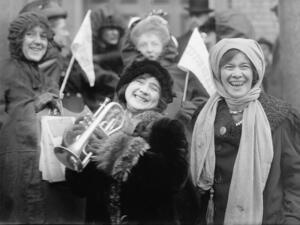Why Women's History Month Insults Women
Every year, college campuses and feminist institutions set aside one month to celebrate the trials and achievements of women throughout history. Many of these women are virtually unknown to the public due to their absence from most history books. To combat this issue, Women’s History Month was established to shed light on these unsung heroes.
While the intentions behind WHM are well meaning, there is one major problem with it: There is no such thing as women’s history.
History is the honest, unbiased account of past events. It includes everyone in every time, every tragedy and every triumph. It does not exclude groups of people, or gloss over details of their contributions to society. Nor do certain historical events belong only to those involved. The problem in telling history, however, is that certain people get left out of the stories, leaving a major gap in our understanding of what happened.
If we flip through the pages of the average high school history book, we’ll find that most chapters focus on the history of western white people. More specifically, they highlight stories of white western Christian men. The danger in this narrow perspective of history is that it implies that those who do not fall into this category did not play any key roles in shaping and developing societies. The truth is, our history books fail us. The reason people are ignorant about women’s roles in history is because the stories are simply not taught in classrooms.
There is only one history, and it is all of ours. While little white Christian boys are fairly well represented in their history classes, it’s time girls and minorities feel the same. Labeling historical events involving women as “women’s history” implies that it is somehow separate from the rest of history, and that it doesn’t pertain to anyone who does not identify as a woman. If the history we learn in school isn’t labeled “white men’s history,” there is no need for amazing women of the past to be subject to such condescending and detrimental language.
Combatting the absence of women in our textbooks shouldn’t involve dedicating a few weeks out of an entire year to acknowledging women’s accomplishments. Women’s History Month gives credibility to our discriminatory education, maintaining the status quo and patronizing over half of our population with a month of representation. Just as women deserve equal representation in all sectors of society, like politics, business, the media, we deserve our rightful place in history. Four weeks out of fifty-two is not equality. The only real solution is transferring WHM curricula into our formal education. Anything else insults the legacies of the brave and inspiring women who came before us.







I wholeheartedly agree! Dedicating a month to women is implying and reinforcing that women are separate. In order to create true equality between men and women, their influence on the world should be discussed equally.
In reply to <p>I wholeheartedly agree! by Naomi
Well said, Naomi! Thanks for responding!